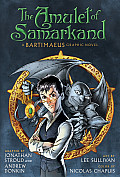Bartimaeus Flattened on the Page
Andrew Donkin shares credit for the script of the Amulet of Samarkand graphic novel with Jonathan Stroud, just as he shared credit for the Artemis Fowle adaptation with Eoin Colfer.
I thought the Artemis Fowle comic was very good, equal or perhaps even better than the novel. However, I thought the comics adaptation of the first Bartimaeus novel was merely a flattened version of the original.
The Samarkand art, by draftsman Lee Sullivan and colorist Nicolas Chapuis, is just fine. Their pictures of a magical London are terrific; I especially like the way their London Eye has the five-pointed pentagram inside it. I found it somewhat difficult to follow how old Nathaniel was in different scenes as the narrative flashed back and forth, but that really points to the larger problem in this adaptation.
Colfer’s Artemis Fowle was practically made for the comics form. The narrative voice is an omniscient, detail-oriented third person. The conflict is built on opposing teams with clear goals. The narrative is built up from plot twists in the physical world rather than realizations in the mental one. The characters cover a broad range of physical types, with corresponding personalities.
In contrast, Stroud’s Bartimaeus books are a triumph of narration. There’s Bartimaeus’s own voice, with its boasts and footnotes, which brief comics captions can barely replicate. That voice helps us follow the djinn through his shapeshifting and world-jumping while in the graphic format we have to see Bartimaeus from the outside.
The novel’s other, third-person narrative voice shows us Nathaniel growing up and working his schemes. It provides the sense of distance useful for an anti-hero while letting us into his head as he thinks and rethinks.
The narration also keeps the timing of different scenes distinct. In the comics version, there’s a short sepia-toned flashback to when Nathaniel was very little, but all the other scenes unfold before us looking like the present, differentiated only by captions saying NOW and BEFORE.
Indeed, I wonder if this form would have worked better if it started at Chapter 11, “The Day Everything Changed”; using Nathaniel’s confrontation with Simon Lovelace to fill us in on the boy’s background and world; and then proceeding chronologically. That approach would have kept Bartimaeus off the stage for longer. However, if we can’t hear his voice in all its glory, it’s unfortunately not such a loss.
I thought the Artemis Fowle comic was very good, equal or perhaps even better than the novel. However, I thought the comics adaptation of the first Bartimaeus novel was merely a flattened version of the original.
The Samarkand art, by draftsman Lee Sullivan and colorist Nicolas Chapuis, is just fine. Their pictures of a magical London are terrific; I especially like the way their London Eye has the five-pointed pentagram inside it. I found it somewhat difficult to follow how old Nathaniel was in different scenes as the narrative flashed back and forth, but that really points to the larger problem in this adaptation.
Colfer’s Artemis Fowle was practically made for the comics form. The narrative voice is an omniscient, detail-oriented third person. The conflict is built on opposing teams with clear goals. The narrative is built up from plot twists in the physical world rather than realizations in the mental one. The characters cover a broad range of physical types, with corresponding personalities.
In contrast, Stroud’s Bartimaeus books are a triumph of narration. There’s Bartimaeus’s own voice, with its boasts and footnotes, which brief comics captions can barely replicate. That voice helps us follow the djinn through his shapeshifting and world-jumping while in the graphic format we have to see Bartimaeus from the outside.
The novel’s other, third-person narrative voice shows us Nathaniel growing up and working his schemes. It provides the sense of distance useful for an anti-hero while letting us into his head as he thinks and rethinks.
The narration also keeps the timing of different scenes distinct. In the comics version, there’s a short sepia-toned flashback to when Nathaniel was very little, but all the other scenes unfold before us looking like the present, differentiated only by captions saying NOW and BEFORE.
Indeed, I wonder if this form would have worked better if it started at Chapter 11, “The Day Everything Changed”; using Nathaniel’s confrontation with Simon Lovelace to fill us in on the boy’s background and world; and then proceeding chronologically. That approach would have kept Bartimaeus off the stage for longer. However, if we can’t hear his voice in all its glory, it’s unfortunately not such a loss.



No comments:
Post a Comment